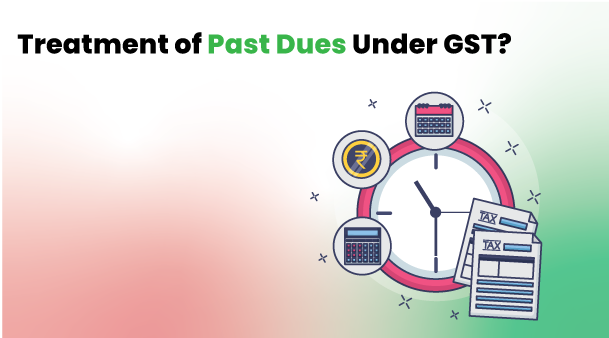Often the industry is faced with situations wherein they will be asked to pay the past dues under the erstwhile Central Excise, Service Tax or Customs, as a result of audit, investigation or adjudication. Now the question before the assessee is on such payment, if it is permitted to avail the input credit of such dues, how to avail them under the current GST regime. Let us examine some cases where such a necessity arises in order to understand the issue:
1. The reverse charge tax was not paid in the past, which was demanded post implementation of GST. Once the RCM is paid with applicable interest, then the input credit of the same is eligible in the hands of the assessee. But since the RCM is paid under the erstwhile service tax regime, how to claim the same under the GST will be a question before him.
2. An assessee has availed Advance Authorisation and imported goods, which could not be put to use as planned. He was asked to pay for the shortfall of his export obligation and accordingly made payment of CVD and SAD. Now the question before him would be how to avail the input credit of such CVD and SAD paid in the current GST regime.
3. An assessee has availed some customs duty notification benefit, which obligates him not to dispose of the goods imported by availing such notification for a certain duration of time. However due to some business exigencies, the assessee is unable to adhere to such post import requirement as mandated under the concessional notification and is forced to dispose of the imported goods. For such failure to adhere to the notification conditions, he has to pay applicable import duties of CVD and SAD with applicable interest. In such a scenario, he is entitled for input credit of these duties paid, but how to avail of the same in the GST regime will be the issue before him.
In the all the above scenarios, the duties paid like RCM, CVD and SAD are creditable under the erstwhile laws. But the payments were made post implementation of GST and that too after expiry of the period for filing the TRAN-1. In all such cases, normally the assesses are applying for refund in cash of such payments by taking recourse to Section 142(3) of CGST Act, 2017 which reads as under:
(3) Every claim for refund filed by any person before, on or after the appointed day, for refund of any amount of CENVAT credit, duty, tax, interest or any other amount paid under the existing law, shall be disposed of in accordance with the provisions of existing law and any amount eventually accruing to him shall be paid in cash, notwithstanding anything to the contrary contained under the provisions of existing law other than the provisions of sub-section (2) of section 11B of the Central Excise Act, 1944:
However the departmental authorities while processing such claims are rejecting it on the ground that the same are not eligible as input credit as per Section 8(a) of CGST Act, 2017, which read as under;
(8) (a) where in pursuance of an assessment or adjudication proceedings instituted, whether before, on or after the appointed day, under the existing law, any amount of tax, interest, fine or penalty becomes recoverable from the person, the same shall, unless recovered under the existing law, be recovered as an arrear of tax under this Act and the amount so covered shall not be admissible as input tax credit under this Act;
(b) where in pursuance of an assessment or adjudication proceedings instituted, whether before, on or after the appointed day, under the existing law, any amount of tax, interest, fine or penalty becomes refundable to the taxable person, the same shall be refunded to him in cash under the said law, notwithstanding anything to the contrary contained in the said law other than the provisions of sub-section (2) of section 11B of the Central Excise Act, 1944 and the amount rejected, if any, shall not be admissible as input tax credit under this Act.
However, in many of the situations the taxes were paid on self assessment basis in order to comply with the notification conditions and they are not result of recovery action initiated by the departmental authorities. Accordingly invoking the above provisions is not correct. The courts have come to the rescue of the assesses in all such cases and have allowed the input credit by invoking the doctrine of necessity as can be seen from the Chennai High Court judgement in the matter of Ganges International Private Limited Vs AC, GST, Puducherry & others in the WP Nos.528, 1092, 1160 of 2019 pronounced on 22.02.2022, wherein the same has been justified in the following paras quoted in the judgment:
43. Normally, the theory of “Doctrine of Necessity” could be invoked when there is a dire necessity with regard to the forum, before whom, the issue has to be referred to and disposed and decided by such forum. Earlier the view was that, it would apply only to judicial matters but in Mohapatra and Company and another Vs. State of Orissa and another [1985] 1 SCR 322, it was held that “the doctrine of necessity applies not only to judicial matters but also to quasi-judicial and administrative matters”.
44. The “Doctrine of Necessity” though would be applied only with regard to the forum or the authority by whom it shall be decided, here, since it is a transitional period from the erstwhile tax regime to the present GST regime, where, the available provisions are to be best utilised by the taxpayers, it become imperative in order to meet the special situation as the one discussed above, to have a forum, for which, the available legal provision of the Act viz., GST Act, 2017 can very well be invoked. The “Doctrine of Necessity” has been best explained in (1996) 4 SCC 104, Election Commission of India and another Vs. Dr. Subramaniam Swamy and another and also in (2006) 3 SCC 276 in State of U.P. Vs. Sheo Shanker Lal Srivastava and others. In a Division Bench judgment of High Court of Delhi in the matter of Duncan Agro Industries Limited Vs. Union of India reported in 1988 (18) ECC 358, the [1985] 1 SCR 322, Mohapatra Company case has been followed.
45. Therefore, though normally the “Doctrine of Necessity” would only be invoked for want of forum, here in the case, it also can be construed that, if Section 142(3) is not permitted to be invoked in meeting situations like this, that situation would render that taxpayer remediless, hence, here also the “Doctrine of Necessity” can be invoked, in the considered opinion of this Court.
In the absence of clear transitional provisions in the case on hand, the courts have opined that resort can be made under Section 142(3) of CGST Act, 2017 and the cash refunds of all such payments can be allowed, provided the input credit of the same is allowed under the erstwhile laws of Central Excise or Service Tax. Some of the recent case laws settled on the above principles are
1. CESTAT Final Order No.42467/2021 dated 16.12.2021 in the case of M/s. Circor Flow Technologies India Private Ltd. – 2022-VIL-15-CESTAT-CHE-ST
2. CESTAT Final Order No.42366/2021 dated 11.10.2021 in the case of M/s. Terex India Ltd. – 2021-VIL-522-CESTAT-CHE-ST
3. CESTAT Final Order No.50157-50159/2022 dated 03.02.2022 in the case of M/s. Mithila Drugs Pvt. Ltd. – 2022-VIL-454-CESTAT-DEL-CE
4. CESTAT Final Order No. 40259-40260 of 2022 in the case of M/s.ITCO Industries Ltd 2022-VIL-456-CESTAT-CHE-CE
Hence the assesses can make payment of old dues under the erstwhile laws and if the same are eligible as input credit, they can seek cash refund of such payments based on the challans under Section 142(3) of CGST Act, 2017 and they can place reliance on the above settled case laws in the support. Trust the lower authorities will adhere to the judicial discipline by accepting these citations as no further appeals were made against these settled cases and the department appears to have accepted them as final orders. Since the controversy has been settled, there appears to be no confusion for claiming the cash refunds of such payment in future.

